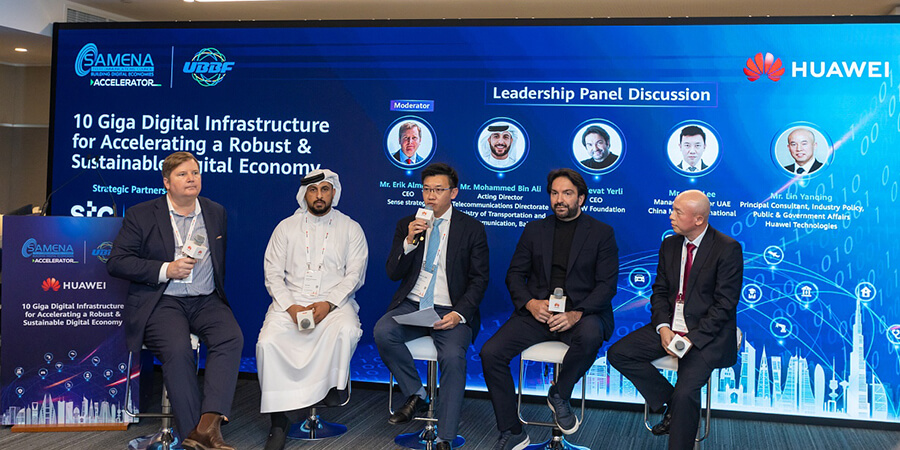Telecom Review was invited to the SAMENA ACCELERATOR leadership panel titled “From Policy to Action,” conducted in collaboration with its member and main technology partner, Huawei Technologies.
Building on the 2021 edition of SAMENA ACCELERATOR, which focused on improving fiberization policies, addressing regulatory and procedural challenges, as well as creating momentum on the shift toward IPv6 transition, the 2023 SAMENA ACCELERATOR on ultra-broadband or “10Giga” networks built a strong case for benefitting from advancements in Fiber and IPv6 innovations.
SAMENA Telecommunications Council believes that advanced Fiber technologies and IPv6, when packaged as critical enablers of Gigabit networks in the SA-ME-NA region, can dramatically help accelerate digital economic development, fulfil ambitious national ICT visions, and pave a path for true industrial and societal transformation in the region and in neighboring regions, such as Central Asia.
In his opening remarks during the SAMENA ACCELERATOR, Bocar BA, CEO & Board Member of SAMENA Council, stated, “Over the next few years, as we strive to achieve the “Giga” milestone, our objective is to create impact beyond just simple Internet. Fixed-line networks, which literally are the backbone of national digital transformation, and are key to sustainable digital development, are the most important infrastructure for communities and businesses, for resilient communication, and for fulfilling national digital visions. Moreover, our technological capabilities, which now extend to 5G-Advanced in mobile systems and to Net5.5G in IP bearer and data center network for the intelligent world, will be playing important role to support the end-to-end network quality for 10 Giga Society. Therefore, SAMENA Council is proposing a move toward 10 Giga, and would like to reiterate the importance of timely policy, regulatory, and business decisions in this regard."
The Panelists in Attendance
The panelists included, Mohammad Ali Bin Ali, Acting Director of the Telecom Directorate, of the Ministry of Transportation and Telecommunications in Bahrain; Alex Lee, Managing Director at China Mobile International; Cevat Yerli, Founder and CEO of the TMRW Foundation; and Lin Yanqing, Principal Consultant, Government Affairs, Huawei.
The panel was moderated by Erik Almqvist, Founder & CEO of Sense Strategy
Examining the Building Blocks of The Digital Landscape
The discussion focused on unraveling the building blocks of an intelligent world – a world with an extensive availability of digital infrastructure—mobile, fixed-line, and cloud— to support the ever-growing 5G connections.
In today's digital landscape, ultra-broadband networks stand as the most critical infrastructure for both communities and businesses. The convergence of fixed-line and fiber networks, along with smart cloud-based technologies harnessing the potential of IPv6, coupled with emerging cloud-based business models, will establish the essential framework for societies to flourish in an increasingly digitalized future.
Given the investments made in 5G (alongside ultra-broadband networks already booming in the region), the panel sought to shed light on what is needed to accelerate ultra-broadband, i.e., 10 Gigabit network, development in the region.
With the “Gigabit society” concept already underway in developed countries, for instance in Europe, the transition to the 10 Gigabit society concepts in the Middle East region was seen as crucial for the advanced digital infrastructure of the next decade.
Q&A with Erik Almqvist
During the media Q&A session, Telecom Review asked Erik Almqvist about the impact of transitioning to 10 gigabit infrastructure for the region’s digital and real economies.
Responding to the question, Almqvist said that high-speed networks are enablers for both the digital and the real economies.
“The link between broadband speed and economic output has been well proven. In the calculations we made more than a decade ago, a doubling of broadband speed means a 0.3% positive boost to national GDP. That is massive if you consider the number of upgrades in speed,” he explained.
Almqvist pointed out that the top trillion-dollar companies are technology companies that are enabled by telecommunications and without the connectivity, they would not be able to function.
“If we look at the Middle East, there are five unicorns in this part of the world – three of them are from the UAE and two from Egypt. All of them are valued at more than $1 billion.”
He emphasized the potential for nurturing more such unicorns over the next decade in the Middle East, facilitated by 10-gigabit infrastructure. He added that the Middle East and the GCC, powered by ultra-modern infrastructure should not only be the hub for entertainment, tourism, energy, but also for the tech industry.
Almqvist noted that by achieving such development, the real economy of the region would see a significant boost.
The panel also covered the following topics:
- How to leverage strategic driving forces for Gigabit networking in the region.
- The anticipated challenges encountered during the implementation of the 10 Gigabit digital infrastructure.
- The importance of regulation, business requirements, stakeholder needs, and end-user expectations.
- A look at the policies required to be able to shift to the 10 Gigabit infrastructures.
- The importance of digital infrastructure for sustainable development goals (SDGs).










